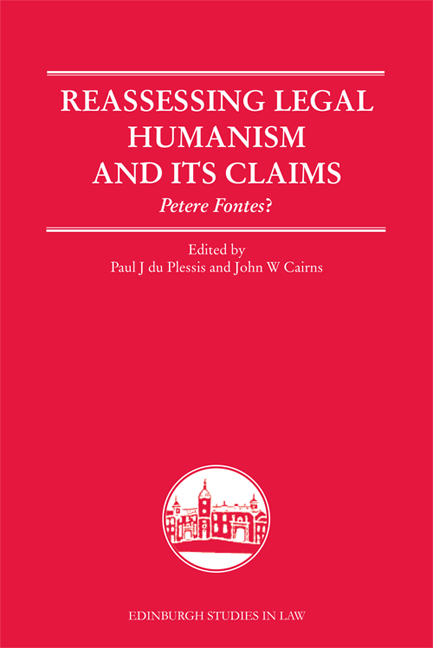Book contents
- Frontmatter
- Contents
- Preface
- A Note on Names and Book Titles
- List of Contributors
- List of Abbreviations
- Introduction
- Part I DEFINING LEGAL HUMANISM
- Part II A BREAK WITH THE PAST/CONTEMPORARY CRITIQUES
- Part III LEGAL HUMANISM: A PAN-EUROPEAN METHODOLOGY?
- 6 Elegant Scholastic Humanism? Arias Piñel's (1515–1563) Critical Revision of Laesio Enormis
- 7 The Working Methods of Hugo Grotius: Which Sources Did He Use and How Did He Use Them in His Early Writings on Natural Law Theory?
- 8 Joannes Leunclavius (1541–1594), Civilian and Byzantinist?
- 9 Brissonius in Context: De formulis et solennibus populi Romani verbis
- 10 A Lawyer and His Sources: Nicolas Bohier and Legal Practice in Sixteenth-Century France
- 11 Humanism and Law in Elizabethan England: The Annotations of Gabriel Harvey
- Part IV LEGAL HUMANISM AND THE BOOK TRADE
- Postscript
- Index
10 - A Lawyer and His Sources: Nicolas Bohier and Legal Practice in Sixteenth-Century France
from Part III - LEGAL HUMANISM: A PAN-EUROPEAN METHODOLOGY?
Published online by Cambridge University Press: 05 September 2016
- Frontmatter
- Contents
- Preface
- A Note on Names and Book Titles
- List of Contributors
- List of Abbreviations
- Introduction
- Part I DEFINING LEGAL HUMANISM
- Part II A BREAK WITH THE PAST/CONTEMPORARY CRITIQUES
- Part III LEGAL HUMANISM: A PAN-EUROPEAN METHODOLOGY?
- 6 Elegant Scholastic Humanism? Arias Piñel's (1515–1563) Critical Revision of Laesio Enormis
- 7 The Working Methods of Hugo Grotius: Which Sources Did He Use and How Did He Use Them in His Early Writings on Natural Law Theory?
- 8 Joannes Leunclavius (1541–1594), Civilian and Byzantinist?
- 9 Brissonius in Context: De formulis et solennibus populi Romani verbis
- 10 A Lawyer and His Sources: Nicolas Bohier and Legal Practice in Sixteenth-Century France
- 11 Humanism and Law in Elizabethan England: The Annotations of Gabriel Harvey
- Part IV LEGAL HUMANISM AND THE BOOK TRADE
- Postscript
- Index
Summary
A. INTRODUCTION
B. A HISTORY OF NICOLAS BOHIER
C. HIS PUBLICATIONS
(1)Bohier as author of Decisiones and Consilia
(2)Bohier: annotator and editor
D. THE CONSILIA
(1)Defining stylus and custom
(2)Bohier's citations
E. CONFLICT AND COMPETING SOURCES: STYLUS, CUSTOM AND IUS COMMUNE
(1)The role of the ius commune in legal practice
(2)Bohier's citations
F. CONCLUSIONS
INTRODUCTION
The aim of this chapter is to assess the meaning of the term ius commune and its relationship with other competing sources of law such as statute and custom in the context of sixteenth-century legal practice in France. This will be achieved through a study of a lawyer, Nicolas Bohier (Nicolaus Boerius) (1469–1539) and his Consilia. One of the greater aims of this chapter is to better inform the narratives about humanism specifically and European legal history generally.
Compared to the jurist, the legal practitioner, together with their own written works, have long been overlooked in traditional accounts of legal his tory. Furthermore, there has been a tendency to generalise in terms of legal humanism and a hastiness to categorise jurists into humanist and “other”. Here in particular, the role of the legal practitioner has not been fully considered. In order to establish the extent to which intellectual movements like legal humanism permeated through to legal practice, it is necessary to look at the texts documenting the law in action, and an understanding of the way lawyers interacted with sources. Also, if the concept of the ius commune in legal practice is similar to that of the theorists, then this will demonstrate the need for the law in practice, its practitioners and their works, to be held in the same regard as the university jurists and their writings. This has the potential to challenge the traditional narrative of legal humanism and its impact on the ius commune.
This will be achieved through a micro-history of Nicolas Bohier and a selection of cases mentioned in his Consilia. His citation practices will also be considered with a view to better understanding what and who represented the ius commune to the sixteenth-century practitioner. Despite his achievements, Nicolas Bohier, an avocat, professor and president of the Bordeaux Parlement, has not received much attention in contemporary scholarship.
- Type
- Chapter
- Information
- Reassessing Legal Humanism and its ClaimsPetere Fontes?, pp. 244 - 281Publisher: Edinburgh University PressPrint publication year: 2015



